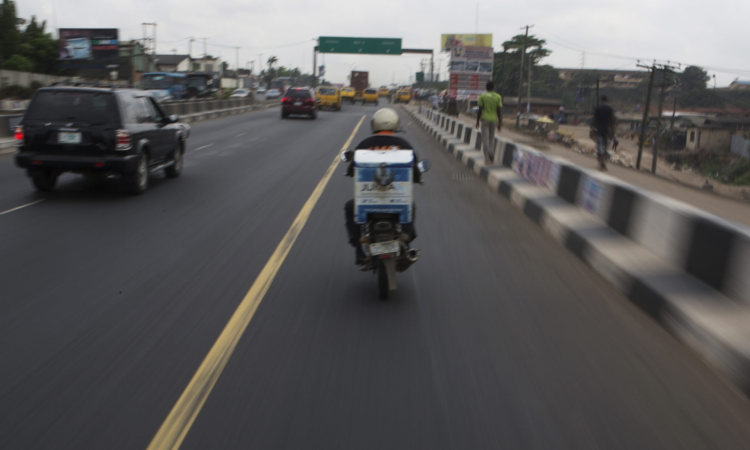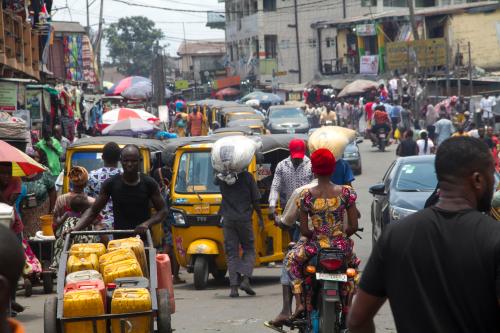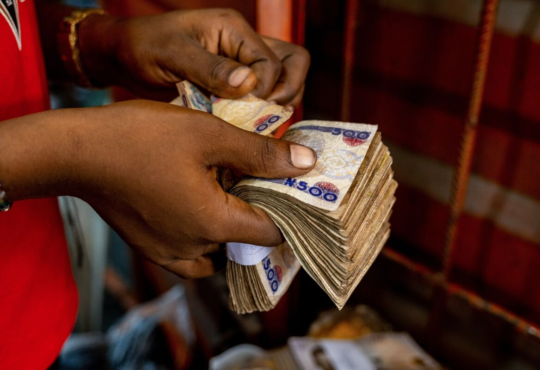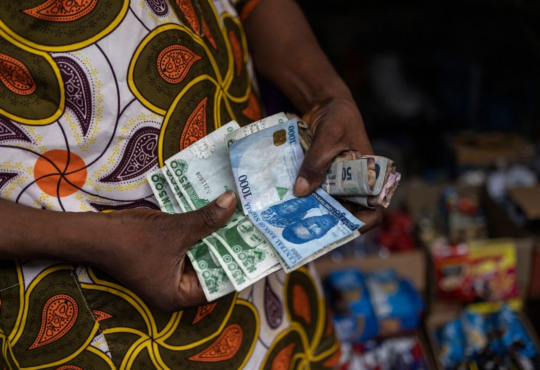
In December 2022, Kingsley Udo, a smartphone merchant in Lagos’ Computer Village, received an order for three iPhones worth 1.2 million naira ($2,595) through his Instagram business page. Following the usual practice, Udo dispatched the phones with a local motorcycle courier, who was supposed to deliver them to the customer in the upscale Lekki neighborhood within two hours. But nine hours later, the customer contacted Udo, complaining he had not received the iPhones. Udo tried to call the delivery person, but the number was switched off. He soon realized he had been duped.
Such losses are common in markets like Computer Village. “The [motorcycle couriers] kept disappointing me,” Blessing Okon, a vendor who sells lifestyle products through social media, told Rest of World. “Sometimes, they would deliver the goods late at night. Other times, the day after.” This inconsistency in deliveries often led to customers canceling orders, Okon said. Her sales dropped from around 100,000 naira ($218) in late 2018 to 60,000 ($131) naira in mid-2022.
Though Nigeria’s small sellers have succeeded in finding more customers through social media, they struggle to find trustworthy ways to deliver orders. Now, a number of local startups are stepping in to solve this problem.
In recent years, there has been an influx of last-mile delivery apps like GIG Logistics, Kwik, Gokada, and Sendbox in Nigeria. While the country’s e-commerce sector is dominated by large, organized players like Jumia, thousands of small businesses are reaching customers via Instagram, WhatsApp, and Facebook, and need the help of last-mile delivery apps to thrive.
These apps allow shopkeepers like Udo and Okon to get packages picked up from their stores by verified professionals, track orders, and make same-day deliveries. Okon made the switch in mid-2022. Her business has since gradually improved, she said. In March 2023, her total sales rose to $435.
Logistics, including last-mile delivery, is a fast-growing industry in Nigeria, fueled by the rising youth population, increased smartphone penetration, and the popularity of electronic payments. According to one estimate, the last-mile delivery market in Africa was worth $1.1 billion in 2021 and is projected to generate $2.35 billion by 2030, with Egypt, South Africa, and Nigeria leading the pack.
Gokada started as a bike-hailing service in 2018. Two years later, it entered the logistics sector and is now among Nigeria’s most popular last-mile apps. “One thing that is clear is the size of the need in this market,” CEO Olutosin Oni told Rest of World. “It’s been challenging; logistics in any part of the world is. But I think what is exciting is the use of technology to solve last-mile delivery issues in a market like Nigeria.”
Gokada has catered to over 30,000 businesses as of 2021, and has raised more than $12.5 million in funding to date. In June 2021, the company announced it had passed $100 million in annualized transaction value.
Another last-mile delivery startup, Kwik, promises to deliver goods within two hours throughout Lagos, and has raised $4.7 million to date. Sendbox, which closed a $1.8 million seed funding round in 2021, has expanded to other markets like Ghana, while ShapShap has attracted investments from Germany-based VC firm GreenTec Capital Partners.
The rise of last-mile apps in Nigeria has also been a boon for riders. Wasiu Ayodele, who previously worked as a traditional delivery rider, used to get orders through word of mouth. He signed up on Gokada in 2021, in hopes that it would bring him more regular work and help him make more money. Ayodele also sought a better work environment. “A friend introduced me to the platform. At the time, I [had] just quit being a dispatch rider because of the regular insults I received from people,” he told Rest of World, referring to the constant abusive language he had to endure from customers. “But after being onboarded onto Gokada, I did not need to look for customers to get one. Gokada refers customers to me, I deliver their orders, and I get paid.” His daily income has tripled compared to what he made as a traditional delivery rider, Ayodele said.
The nascent sector, however, is not without its challenges. Last-mile delivery companies in Nigeria have to deal with concerns like riders’ safety, low trust among customers, poor infrastructure, and high operational costs. Since Oni became CEO in 2022, Gokada has reportedly laid off 75 employees, and there have been talks of acquisition by Kwik.
According to Oni, some of the issues include users entering the wrong address on the app — or sometimes, no addresses — which makes timely deliveries difficult. “In a city like Lagos, for instance, there is Awolowo Street in Ikeja and Ikoyi, and some people just fail to indicate properly which part of the city they are in. We address this by making address suggestions on our app,” he said.
Oni told Rest of World there have also been instances of theft by some riders, as Udo from Computer Village had experienced. He said last-mile startups have been attempting to mitigate this problem by tracking every order.






